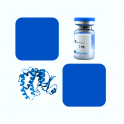
- Remove this product from my favorite's list.
- Add this product to my list of favorites.
Products
Viewed products
Newsletter
 |  |  |  |  |  |

Background
Receptors for the Fc region of IgG (Fc γ R) are members of the Ig superfamily that function in the activation or inhibition of immune responses. Three classes of human Fc γ Rs: RI (CD64), RII (CD32), and RIII (CD16), which generate multiple isoforms, are recognized. There are three genes for human Fcγ RII /CD32 (A, B, and C) and one for mouse Fcγ RII B (CD32B). CD32 is a low affinity receptor for IgG. The activating isoform, CD32A, is expressed on monocytes, neutrophils, platelets and dendritic cells. CD32A is expressed on many immune cell types (macrophage, neutrophil, eosinophils, platelets, dendritic cells and Langerhan cells), where inhibitory ITIMbearing receptors may also be coexpressed and coengaged by specific ligands. CD32A delivers an activating signal upon ligand binding, and results in the initiation of inflammatory responses including cytolysis, phagocytosis, degranulation and cytokine production. The responses can be modulated by signals from the coexpressed inhibitory receptors such as CD32B, and the strength of the signal is dependent on the ratio of expression of the activating and inhibitory receptors.
Source
Recombinant Biotinylated Cynomolgus CD32a, His,Avitag (CDA-C82E5) is expressed from human 293 cells (HEK293). It contains AA Gln 28 - Pro 208 (Accession # Q8SPW4-1).
Predicted N-terminus: Gln 28
Molecular Characterization
This protein carries a polyhistidine tag at the C-terminus, followed by an Avi tag.
The protein has a calculated MW of 23.9 kDa. The protein migrates as 30-33 kDa under reducing (R) condition (SDS-PAGE) due to glycosylation.
Biotinylation
Biotinylation of this product is performed using Avitag™ technology. Briefly, the single lysine residue in the Avitag is enzymatically labeled with biotin.
Passed as determined by the HABA assay / binding ELISA.
Endotoxin
Less than 1.0 EU per μg by the LAL method.
Purity
>95% as determined by SDS-PAGE.
>90% as determined by SEC-MALS.
Formulation
Lyophilized from 0.22 μm filtered solution in PBS, pH7.4. Normally trehalose is added as protectant before lyophilization.
Reconstitution
Please see Certificate of Analysis for specific instructions.
For best performance, we strongly recommend you to follow the reconstitution protocol provided in the CoA.
Storage
For long term storage, the product should be stored at lyophilized state at -20°C or lower.
Please avoid repeated freeze-thaw cycles.
This product is stable after storage at:
-20°C to -70°C for 12 months in lyophilized state;
-70°C for 12 months under sterile conditions after reconstitution.
Bioactivity
Please refer to product data sheet.
(1) "Spontaneous Platelet Aggregation in Blood Is Mediated by FcγRIIA Stimulation of Bruton's Tyrosine Kinase"
Duan, Goldmann, Li et al
Int J Mol Sci (2021) 23 (1)
(2) "Role of Fcγ receptors in HER2-targeted breast cancer therapy"
Musolino, Gradishar, Rugo et al
J Immunother Cancer (2022) 10 (1)
(3) "Platelet FcγRIIA-induced serotonin release exacerbates the severity of transfusion-related acute lung injury in mice"
El Mdawar, Maître, Magnenat et al
Blood Adv (2021) 5 (23), 4817-4830
Showing 1-3 of 46 papers.
Recombinant Human Fc gamma RIIA / CD32a (R167) Protein His Tag (MALS & BLI verified), 100µg - 377,00 €
Recombinant Biotinylated Human Fc gamma RIIIA / CD16a (F176), Avi Tag (Avitag™) , 25µg - 338,00 €
Recombinant Biotinylated Human Fc gamma RIIB / CD32b/c, Avi Tag (Avitag™),25 µg - 468,00 €
Recombinant Biotinylated Mouse Fc gamma RIIB / CD32b, Avi Tag (Avitag™), His-Tag, 25 µg - 468,00 €
Follow us